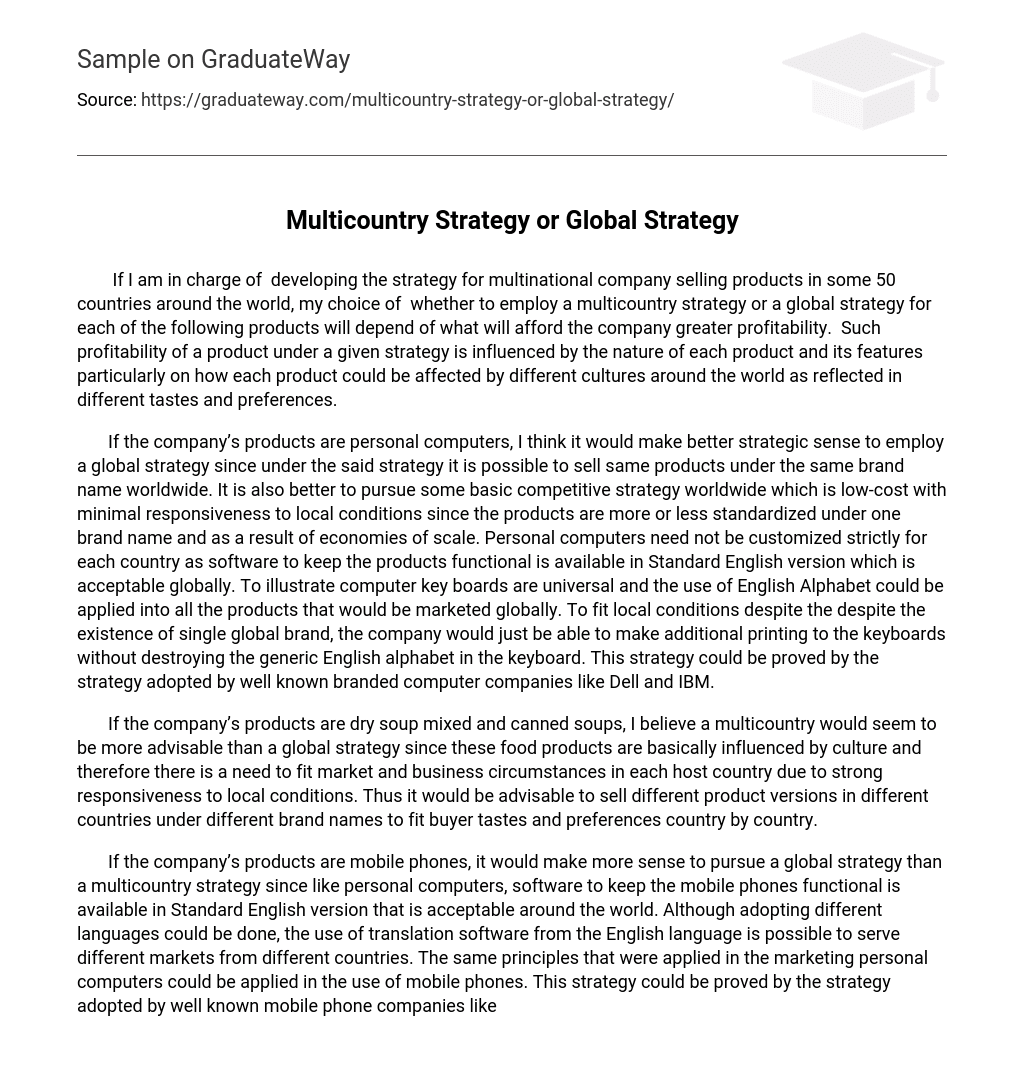If I am in charge of developing the strategy for multinational company selling products in some 50 countries around the world, my choice of whether to employ a multicountry strategy or a global strategy for each of the following products will depend of what will afford the company greater profitability. Such profitability of a product under a given strategy is influenced by the nature of each product and its features particularly on how each product could be affected by different cultures around the world as reflected in different tastes and preferences.
If the company’s products are personal computers, I think it would make better strategic sense to employ a global strategy since under the said strategy it is possible to sell same products under the same brand name worldwide. It is also better to pursue some basic competitive strategy worldwide which is low-cost with minimal responsiveness to local conditions since the products are more or less standardized under one brand name and as a result of economies of scale. Personal computers need not be customized strictly for each country as software to keep the products functional is available in Standard English version which is acceptable globally. To illustrate computer key boards are universal and the use of English Alphabet could be applied into all the products that would be marketed globally. To fit local conditions despite the despite the existence of single global brand, the company would just be able to make additional printing to the keyboards without destroying the generic English alphabet in the keyboard. This strategy could be proved by the strategy adopted by well known branded computer companies like Dell and IBM.
If the company’s products are dry soup mixed and canned soups, I believe a multicountry would seem to be more advisable than a global strategy since these food products are basically influenced by culture and therefore there is a need to fit market and business circumstances in each host country due to strong responsiveness to local conditions. Thus it would be advisable to sell different product versions in different countries under different brand names to fit buyer tastes and preferences country by country.
If the company’s products are mobile phones, it would make more sense to pursue a global strategy than a multicountry strategy since like personal computers, software to keep the mobile phones functional is available in Standard English version that is acceptable around the world. Although adopting different languages could be done, the use of translation software from the English language is possible to serve different markets from different countries. The same principles that were applied in the marketing personal computers could be applied in the use of mobile phones. This strategy could be proved by the strategy adopted by well known mobile phone companies like Nokia and Motorola.
If the company’s products are basic work tools (hammers, screwdrivers, pliers, wrenches and saws), a global strategy would have more appeal than would a multicountry strategy since the use of these products are generic or universal in nature. What is hammer in one country could also be hammer and there could no unique product attributes that would be required to fit buyer tastes and preferences country by country so as to justify the use of multicountry strategy. Because products would be generic or universal, it would be advisable to sell same products under the same brand name worldwide. This in effect will focus company efforts on building global brands as opposed to strengthening local/regional brands sold on local/regional markets. As a result of possibly one global brand, the company would be in a position to pursue some basic competitive strategy worldwide, which could either be best-cost, focused low-cost or focused differentiation with minimal responsiveness to local conditions. Because of single brand name under global strategy there would be no special need to adapt marketing and distribution to local customs and culture of each country as would be required under multicountry strategy. This strategy could be proved by the strategy adopted by well known companies like Stanley Works (2008).
Clearly, this paper has shown the basis for using a certain strategy for each product. As a strategist, correct decision must be made to attain the corporate objective of profitability and higher wealth for stockholders (Brigham and Houston, 2002).
References:
Brigham and Houston (2002) Fundamentals of Financial Management, Thomson South-Western, US
Case Study with given Four Questions on Multicountry Strategy and Global Strategy.
Stanley Works, Company Website, {www document} URL, http://www.stanleyworks.com/, Accessed June 1, 2008





